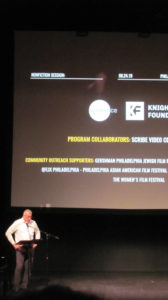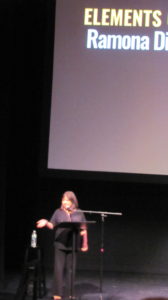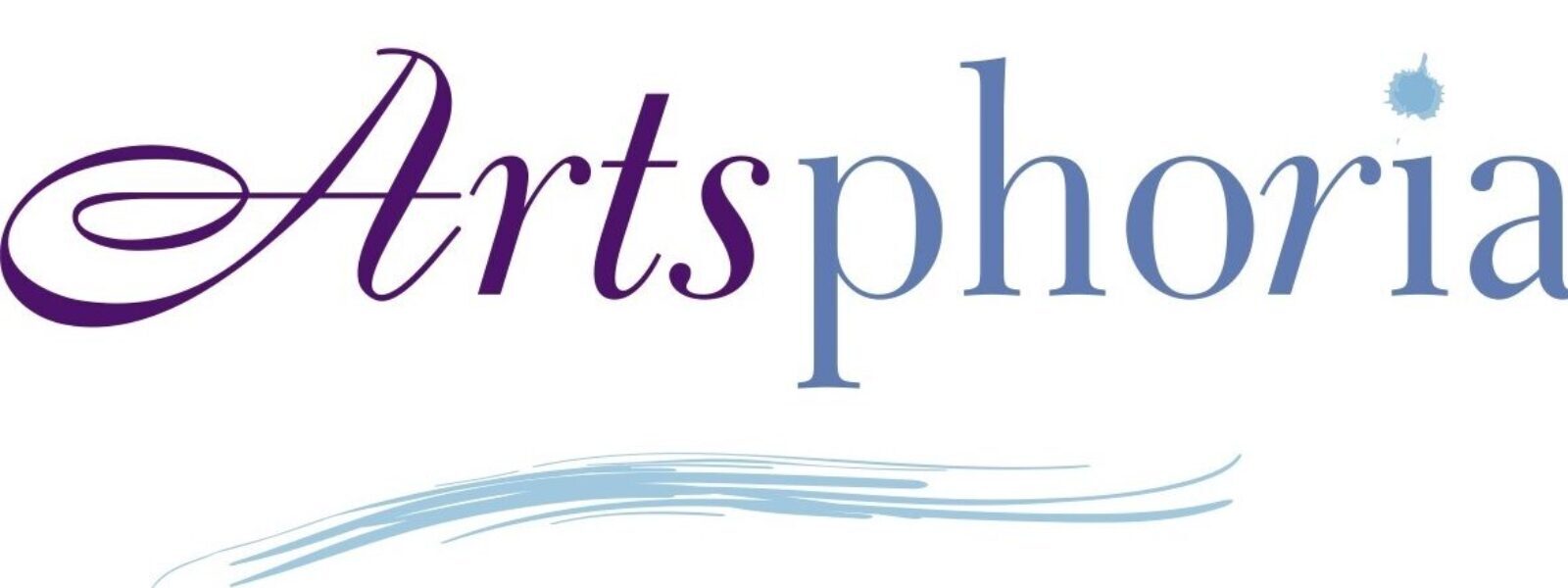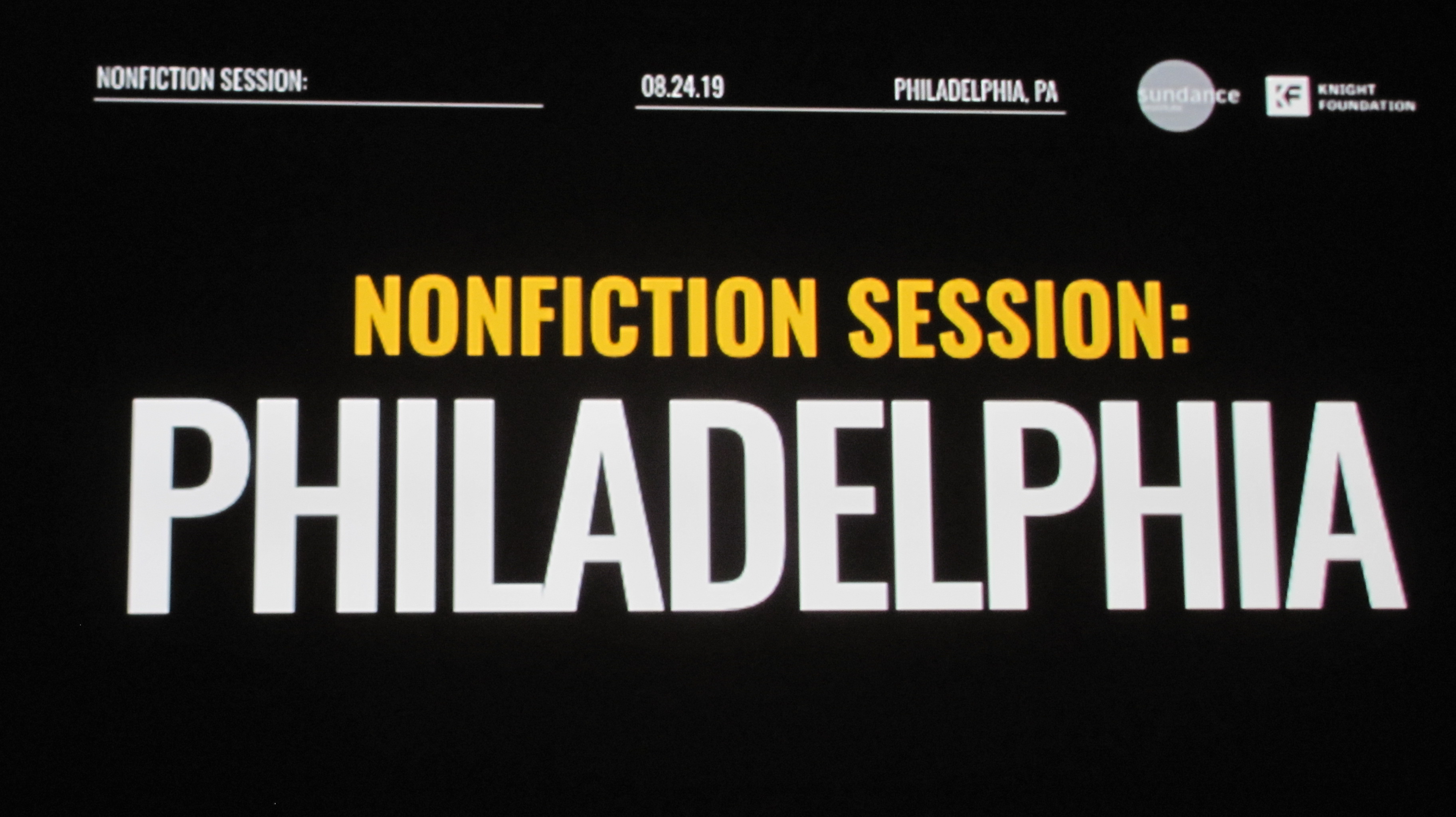By Andrea Karen Hammer
During a recent program at the Suzanne Roberts Theatre, the Sundance Institute presented “Nonfiction Filmmaking Session: Philadelphia” in collaboration with Scribe Video Center and PhillyCAM. The John S. and James L. Knight Foundation made this outstanding event in Philadelphia possible.

Richard Ray Perez, who oversees Documentary Film Program partnerships at the Sundance Institute, introduced the speakers and moderated the sessions. During the opening, he referred to the “power of movies” and the founding of Sundance based on the “belief in artists on the fringe who are taking risks, developing original stories and authentic voices and pushing creative boundaries.”
As a filmmaker who has also worked at the Sundance Institute for 7 years, Perez said that he “understands the difficult process of making a good documentary film, which illuminates the human experience. He compared the experience with being part of a jazz ensemble, emphasizing the need for co-writing during the “telling” process and editing as critical step to create a good documentary film.
“We’re in an era with more documentary films than ever. All of the easy films have already been made,” Perez said. “We need to dig deep to make outstanding films now. Try to make relevant films and help build your own community with local organizations and as individuals, with community building as the goal.”
Before introducing the first speaker, filmmaker Ramona Diaz, Perez noted that the story informs who will work with, fund and broadcast a film project. He said that another key factor to consider is: Has anyone told the story before?
“The story is the seed where everything blossoms, Perez said.
Award-Winning Filmmaker Ramona Diaz

Ramona Diaz is an award-winning filmmaker whose films have been screened and recognized at the Sundance Film Festival (including the 2017 Special Jury Award for Motherland). She began her presentation by reinforcing the importance of story.
“What inspires me is examining a story deeply,” she said. “The question is always: What do I want to examine for 3 to 5 years?”
Raised in the Philippines, Diaz added that films lose their magic if “messages” are the sole focus. Instead, she becomes “obsessed” with themes, characters and stories in an observational format.
Documentary Filmmaking Process
The filmmaker often reads something that sparks an idea, character or theme. Then, she looks for the story.
While discussing her work on Imelda (2004), Diaz recommended always asking for an interview, which may be granted, with someone in power. The filmmaker was given 5 minutes with Imelda Marcos but stayed 5 hours. Diaz said that the former First Lady of the Philippines, who made headlines for her massive shoe collection, was ready to tell her story.
“It would have been easy to make fun of her. I was interested in a story about this woman with power, ” Diaz said.
The filmmaker showed a film clip with Mrs. Marcos standing by her husband’s tomb and emotionally saying, “Here lies love.” Diaz described her persistence in trying to film at this location, after being told repeatedly that it would never happen.
Then, she shared another valuable tip:
“After you ask the last question, just sit in silence,” Diaz said. “People hate a vacuum and fill it with a golden comment.”
The filmmaker added that this technique works most effectively in the West versus the East, where some including Mrs. Marcos are comfortable with silence.
“She never let go the the performance and was never off camera. I examined her position, power and downfall,” Diaz said.
Observational Style in Documentary Filmmaking
Then, the filmmaker discussed her work on The Learning, following four Filipino teachers in America. She described her purely observational approach in which the “character doesn’t break the fourth wall.”
Diaz said that she simply shows life, with the belief that the audience will find a way to understand. The filmmaker thinks that her job is to put experiences on the screen, and viewers will find something that resonates.
While discussing the filming of Motherland, Diaz emphasized her ongoing interest in watching a story unfold rather than using interviews. During this project, she wanted to focus on body language and cadence of speech at one of the busiest hospitals in the world.
She initially was thinking about reproductive justice and fleeting communities of mothers navigating health care. Diaz added that it is vital, as a filmmaker, to ask: What makes your voice different?
Before a Q&A session with the filmmaker, Perez said to Diaz: “You had a kernel of an idea and a type of fluidity. You let wisdom emerge.”
Diaz replied by saying: “You need to be Zen and patient and open. Sometimes, it takes days. I want to go on a journey of surprise and land in a place where I didn’t start.”
The filmmaker added that she reads everything about a topic: the pros, cons and every side. At the end of her session, Diaz emphasized that “funders want you to think deeply about a subject.”
Filmmaker Tips for “Navigating the Funding Landscape”
To read more about filmmaker Ramona Diaz and her observations about documentary filmmaking during a panel discussion, see “Navigating the Funding Landscape.”


[…] Intro to Sundance Philadelphia Session and “Elements of Effective Nonfiction Films” […]
[…] Intro to Sundance Philadelphia Session and “Elements of Effective Nonfiction Films” […]